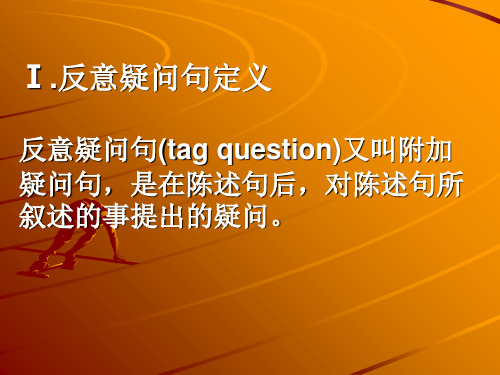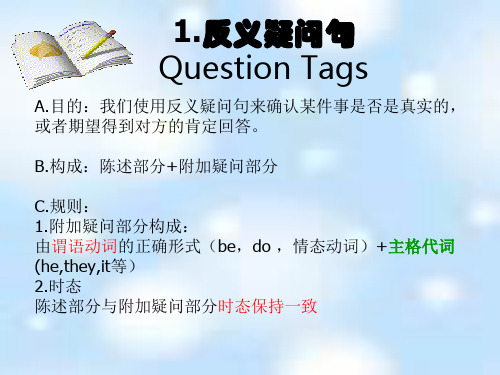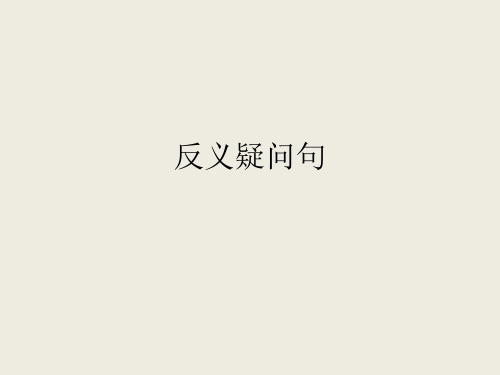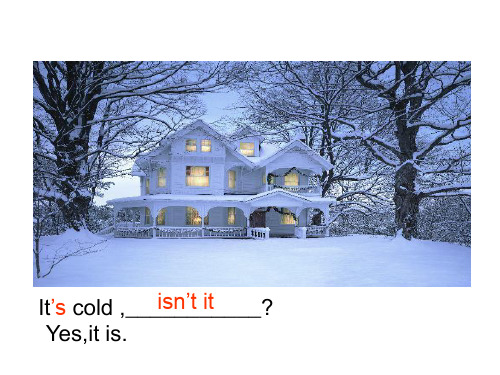反意疑问句PPT课件
合集下载
反意疑问句ppt课件

• Jack wasn’t playing soccer, _w__a_s _h_e___? • Their parents have gone to London,
__h_a_v_e_n_’_t t_h_e_y__? • I have never been to the park, __h_a_v_e_n’_t_I__? • You have a good friend, __d_o_n_’t_y_o_u___? • We had a meeting, __d_i_d_n_’t_w_e___?
Grammar: 反意疑问句
一、定义:
当我们陈述了一个事实,而又不是很 有把握,就可以在陈述句后加一个简 短问句,称为反意疑问句。它表示提 问人的看法,没有把握,需要对方证 实。反义疑问句由两部分组成:前一 部分是一个陈述句,后一部分是一个 简短的疑问句,两部分的人称时态应 保持一致。
二、结构:
结构一: 前肯,+ 后否 eg. She is a student, isn’t she?
结构二: 前否,+ 后肯 eg. She isn’t a student, is she?
三、反意疑问句的解答步骤
1. 判定(判断该用肯定还是否定); 2. 找动(找句子的助动词:be用be,动词原形do, 三单does,过去did,完成have); 3. 换代(将主语换为人称代词);
2. 一般动词(play, study, watch 等)句型:
现在 主语+play/plays…, don’t (doesn’t) + 主语? 过去 主语+played…, didn’t + 主语?
1 Your mother likes cooking ,_d__o_e_s_n_’t_s_h_e___? 2 He has an apple, __d_o_e_s_n_’_t _h_e____? 3 The plane took off an hour ago, __d_i_d_n_’t_i_t___? 4 He didn’t go to school late this morning,
完整反义疑问句课件

如果陈述句是肯定的,反义疑问句应该是否定的。
2 人称一致
陈述句和反义疑问句中的主语和动词人称要保持一致。,避免使用复杂的句子结构。
结束语
通过学习反义疑问句的结构和用法,我们可以更好地理解和运用这个表达方 式,提升我们的语言表达能力。
完整反义疑问句PPT课件
PPT介绍反义疑问句
什么是反义疑问句?
反义疑问句是指一种用于提问或表示疑问的句子结构,通常由一个陈述句和一个反义疑问句构成。
反义疑问句的结构
1
陈述句部分
包含陈述句的主谓宾结构
2
反义疑问句部分
由一个助动词和一个否定词构成
3
连接词
连接陈述句和反义疑问句的部分,常用的连接词包括but和yet
反义疑问句的语气和语调
语气
反义疑问句通常用于表示疑问、请求或强调某 种认可的语气。
语调
反义疑问句通常以升调结尾,以引起对方的回 答或注意。
反义疑问句的用法与例句
询问意见
这个计划听起来很好,不是吗?
表示认可
你很喜欢这部电影,对吗?
确认信息
你不会去参加聚会,对吗?
反义疑问句的注意事项
1 肯定陈述,否定反义疑问
2 人称一致
陈述句和反义疑问句中的主语和动词人称要保持一致。,避免使用复杂的句子结构。
结束语
通过学习反义疑问句的结构和用法,我们可以更好地理解和运用这个表达方 式,提升我们的语言表达能力。
完整反义疑问句PPT课件
PPT介绍反义疑问句
什么是反义疑问句?
反义疑问句是指一种用于提问或表示疑问的句子结构,通常由一个陈述句和一个反义疑问句构成。
反义疑问句的结构
1
陈述句部分
包含陈述句的主谓宾结构
2
反义疑问句部分
由一个助动词和一个否定词构成
3
连接词
连接陈述句和反义疑问句的部分,常用的连接词包括but和yet
反义疑问句的语气和语调
语气
反义疑问句通常用于表示疑问、请求或强调某 种认可的语气。
语调
反义疑问句通常以升调结尾,以引起对方的回 答或注意。
反义疑问句的用法与例句
询问意见
这个计划听起来很好,不是吗?
表示认可
你很喜欢这部电影,对吗?
确认信息
你不会去参加聚会,对吗?
反义疑问句的注意事项
1 肯定陈述,否定反义疑问
新概念英语第三册反义疑问句课件

It must have rained last night, did’t it?
昨晚一定下雨了,是吗?
②主语+must have done, haven’t +主语?
(无明显过去的时间)
It must have rained, hasn’t it?
一定下雨了,是吗?
特别注意(2):ought to
There is a cup on the table, isn’t there?
桌上有一个杯子,不是吗,不是吗?
3.陈述部分主语为指示代词,疑问部分主语用it/they
This is a book, isn’t it?
this/that→it
这是一本书,不是吗?
These are your friends , aren’t they?
(be动词与主语保持一致)
He must be an actor, isn’t he?
他一定是个演员,不是吗? They must be friends, aren’t they? 他们一定是朋友,不是吗?
2.对过去的推测
①主语+must have done, didn’t +主语? (有明显过去的时间)
这谁也不怨,对不对?
Everyone is having a good time, aren’t they?
每个人都玩的很开心,不是吗?
5.陈述部分主语为复合不定代词(物)疑问部分主语 用it.
Everything is ready. Isn’t it ?
一切都准备好了。是吗?
something, anything,nothing, everything等
陈述部分ought to,疑问部分 should’t/oughtn’t He ought to know what to do, oughtn’t/shouldn’t he? 他应该知道该做什么,不是吗?
昨晚一定下雨了,是吗?
②主语+must have done, haven’t +主语?
(无明显过去的时间)
It must have rained, hasn’t it?
一定下雨了,是吗?
特别注意(2):ought to
There is a cup on the table, isn’t there?
桌上有一个杯子,不是吗,不是吗?
3.陈述部分主语为指示代词,疑问部分主语用it/they
This is a book, isn’t it?
this/that→it
这是一本书,不是吗?
These are your friends , aren’t they?
(be动词与主语保持一致)
He must be an actor, isn’t he?
他一定是个演员,不是吗? They must be friends, aren’t they? 他们一定是朋友,不是吗?
2.对过去的推测
①主语+must have done, didn’t +主语? (有明显过去的时间)
这谁也不怨,对不对?
Everyone is having a good time, aren’t they?
每个人都玩的很开心,不是吗?
5.陈述部分主语为复合不定代词(物)疑问部分主语 用it.
Everything is ready. Isn’t it ?
一切都准备好了。是吗?
something, anything,nothing, everything等
陈述部分ought to,疑问部分 should’t/oughtn’t He ought to know what to do, oughtn’t/shouldn’t he? 他应该知道该做什么,不是吗?
反意疑问句课件

19)否定前缀不能视为否定词, 其反意疑问句仍用否定形式。
It is impossible, isn't it?
He is not unkind to his classmates, is he?
6. 反义疑问句的回答用yes,no 但是,当陈述部分是否定形式时, 回答要按事实。 They don’t work hard, do they? Yes, they do.
Nobody will go, will they?
16)带情态动词dare或need的反 意疑问句,疑问部分常用 need (dare ) +主语。
We need not do it again, need we ? He dare not say so, dare you?
当dare, need 为实义动词时, 疑问部分用助动词 do + 主语。
3)陈述部分用 no, nothing, nobody, never, few, seldom, hardly, rarely, little等否定含义 的词时,疑问部分用肯定含义。
The Swede made no answer, did he / she? Some plants never blown (开 花), do they ?
Let us 开头的祈使句,后 用will you?
Let's go and listen to the music, shall we? Let us wait for you in the reading-room, will you ?
Let’s go fishing, _s_h_a_l_l _w_e? Let us do this job,_w__il_l _y_o_u? Turn on the radio,w__il_l_y_o_u_?
反义疑问句详细讲解课件(PPT27张)

I don’t believe he has finished his work.
7.当陈述部分的主句是I think (expect, believe)等结构时,反 意疑问句的附加部分则往往与从 句中的主语和谓语动词保持对应 关系,但要注意否定的转移。 例如:
I think he’s funny, isn’t he? I don’t believe she likes my
You must have seen the film last week, didn’t you?
6. 当陈述部分是I am…时,反意疑 问句部分通常要用aren’t I;如陈述 句部分的主语是I am not时,反意疑 问句部分通常要用am I。 例如:
1)I am a teacher, aren’t I?
Ⅰ.反意疑问句定义
反意疑问句(tag question)又叫附加 疑问句,是在陈述句后,对陈述句所 叙述的事提出的疑问。
Ⅱ.基本结构:
陈述句+逗号+简短的一般疑问句?
遵循前肯定后否定前否后肯式的原则
①前肯后否式。例如:
You are all students, aren’t you﹖
②前否后肯式。例如:
Let’s have a rest, shall we? 以let us开头的祈使句,不包括 说话人在内,因此反意疑问句的 附加部分用will you。例如:
Let us stop now, will you?
Ⅳ. 反意疑问句的回答 “ 根据事实回答”
对反意疑问句的回答,无论问题的提法如何,如果 事实是肯定的,就用yes,事实是否定的,就要用no。 要特别注意陈述句部分是否定结构,反意疑问句部分 用肯定式提问时,回答yes或no与汉语正好相反。这 种省略回答的yes要译成“不”,no要译成“是”。
7.当陈述部分的主句是I think (expect, believe)等结构时,反 意疑问句的附加部分则往往与从 句中的主语和谓语动词保持对应 关系,但要注意否定的转移。 例如:
I think he’s funny, isn’t he? I don’t believe she likes my
You must have seen the film last week, didn’t you?
6. 当陈述部分是I am…时,反意疑 问句部分通常要用aren’t I;如陈述 句部分的主语是I am not时,反意疑 问句部分通常要用am I。 例如:
1)I am a teacher, aren’t I?
Ⅰ.反意疑问句定义
反意疑问句(tag question)又叫附加 疑问句,是在陈述句后,对陈述句所 叙述的事提出的疑问。
Ⅱ.基本结构:
陈述句+逗号+简短的一般疑问句?
遵循前肯定后否定前否后肯式的原则
①前肯后否式。例如:
You are all students, aren’t you﹖
②前否后肯式。例如:
Let’s have a rest, shall we? 以let us开头的祈使句,不包括 说话人在内,因此反意疑问句的 附加部分用will you。例如:
Let us stop now, will you?
Ⅳ. 反意疑问句的回答 “ 根据事实回答”
对反意疑问句的回答,无论问题的提法如何,如果 事实是肯定的,就用yes,事实是否定的,就要用no。 要特别注意陈述句部分是否定结构,反意疑问句部分 用肯定式提问时,回答yes或no与汉语正好相反。这 种省略回答的yes要译成“不”,no要译成“是”。
完整反义疑问句课件

04
反义疑问句的回答
肯定回答
要点一
肯定回答时,通常使用“Yes”来 回答反义疑问句,并重复…
You like apples, don’t you? 回答:Yes, I do.
要点二
如果对反义疑问句中的否定部分 进行强调,可以使用“Yes…
You didn’t go to the party, did you? 回答:Yes, I did.
详细描述
反义疑问句是一种常见的语法结构,通常用于表达说话者的 态度、观点或对某件事情的疑问。它的特点是前半部分是一 个肯定或否定的陈述句,而后半部分则通过疑问的形式表达 相反的意思。
类型
总结词
反义疑问句可以分为两种类型,即标准反义疑问句和非标准反义疑问句。
详细描述
标准反义疑问句的前半部分是一个肯定句,后半部分是一个否定疑问句;或者 前半部分是一个否定句,后半部分是一个肯定疑问句。而非标准反义疑问句则 不遵循这一规则,前后两部分没有明显的相反意思。
总结词
表示某些特殊情况或特殊用法,需要特 别注意。
VS
详细描述
在某些特殊情况下,反义疑问句的用法可 能会发生变化。例如,当陈述句为祈使句 时,反义疑问句通常会省略主语;当陈述 句为感叹句时,反义疑问句通常会省略疑 问词。此外,还有一些特殊的反义疑问句 结构,如“他不是学生吗?”等,需要特 别注意其用法和含义。
否定回答
要点一
否定回答时,可以使用“No”来 回答反义疑问句,并重复疑…
You don’t like coffee, do you? 回答:No, I don’t.
要点二
如果对反义疑问句中的肯定部分 进行强调,可以使用“No,…
You went to the concert, didn’t you? 回答:No, I didn’t.
反意疑问句_精品课件1

9 He didn’t say anything about your mistakes, __d__id__h_e___?
10 Tom can swim very well, _c_a_n_’_t_h_e___? 11 All of your friends will come to your party,
Competition 1 Challenge yourself
100A 200A 300A 100B 200B 300B 100C 200C 300C
Grammar: 反意疑问句
一、定义:
当我们陈述了一个事实,而又不是很 有把握,就可以在陈述句后加一个简 短问句,称为反意疑问句。
例: 1. She is a student, isn’t she? 2. We speak Chinese, don’t we?
4. 完成时的反意疑问句
主语+have/has&#+ 主语?
1 You have heard of him,h_a_v_e_n_’_t _y_o_u_____? 2 He has been to America, _h_a_s_n_’_t _h_e______? 3 Marry hasn’t lived in the countryside, __h_a_s__s_h_e______? 4 You haven’t been to Shanghai, __h_a_v_e__y_o_u_? 5 They have never been to Hong Kong, __h_a_v_e__th_e_y_____?
There will be an exam soon,_w_o_n_’_t _t_h_e_re___?
Bad luck!
10 Tom can swim very well, _c_a_n_’_t_h_e___? 11 All of your friends will come to your party,
Competition 1 Challenge yourself
100A 200A 300A 100B 200B 300B 100C 200C 300C
Grammar: 反意疑问句
一、定义:
当我们陈述了一个事实,而又不是很 有把握,就可以在陈述句后加一个简 短问句,称为反意疑问句。
例: 1. She is a student, isn’t she? 2. We speak Chinese, don’t we?
4. 完成时的反意疑问句
主语+have/has&#+ 主语?
1 You have heard of him,h_a_v_e_n_’_t _y_o_u_____? 2 He has been to America, _h_a_s_n_’_t _h_e______? 3 Marry hasn’t lived in the countryside, __h_a_s__s_h_e______? 4 You haven’t been to Shanghai, __h_a_v_e__y_o_u_? 5 They have never been to Hong Kong, __h_a_v_e__th_e_y_____?
There will be an exam soon,_w_o_n_’_t _t_h_e_re___?
Bad luck!
人教版英语八年级上册-Unit 10 反义疑问句(课件)

I think you are right, aren’t you?
I don’t believe he studies harder, does he?
He never said he was a good student, did he?
四.陈述部分主语是 everyone, everybody, someone, somebody, anybody, no one, nobody等时, 疑问部分用 they/he;陈述部分是everything, something, nothing, anything 时,疑问部分用 it .
5. Please call me, ____________? 6.Don’t be late next time, __________?
2.在Let’s祈使句后加上 shall we? shan’t we? 在Let us(me, him..) 后加上 will you? 或
won’t you?
二.陈述部分是I am 或 I’m 时,疑问部分用 aren’t I.
I am having an English lesson, __a_re_n_’_t_I__?
三.宾语从句中,以主句为准,但如果主语是第一人称 (I/We)且谓语动词是think, believe, guess, suppose 时, 以从句为准.
These are your friends, aren’t they?
注意
1.前否后肯要根据事实来回答,事实是肯定的用 Yes.事实是否定的用No.
2.前否后肯的Yes译为“不”,No译为“是的”。
1.You aren’t a teacher, are you?你不是老师,是吗? Yes, I am. 不,我是。/ No, I’m not.是的,我不是。
I don’t believe he studies harder, does he?
He never said he was a good student, did he?
四.陈述部分主语是 everyone, everybody, someone, somebody, anybody, no one, nobody等时, 疑问部分用 they/he;陈述部分是everything, something, nothing, anything 时,疑问部分用 it .
5. Please call me, ____________? 6.Don’t be late next time, __________?
2.在Let’s祈使句后加上 shall we? shan’t we? 在Let us(me, him..) 后加上 will you? 或
won’t you?
二.陈述部分是I am 或 I’m 时,疑问部分用 aren’t I.
I am having an English lesson, __a_re_n_’_t_I__?
三.宾语从句中,以主句为准,但如果主语是第一人称 (I/We)且谓语动词是think, believe, guess, suppose 时, 以从句为准.
These are your friends, aren’t they?
注意
1.前否后肯要根据事实来回答,事实是肯定的用 Yes.事实是否定的用No.
2.前否后肯的Yes译为“不”,No译为“是的”。
1.You aren’t a teacher, are you?你不是老师,是吗? Yes, I am. 不,我是。/ No, I’m not.是的,我不是。
英语反义疑问句PPT课件

19no21shehas5nooneboyscansingdoesshe203陈述句部分出现fewlittlehardly几乎不等虽不是否定词但表示否定意义的词时反意疑问部分应用肯定形式
.
1
Tag questions
反义疑问句
.
2
summary
1.结构:
陈述句+简短反义疑问句(助动词\be动词\情态动 词+陈述部分主语的相应代词)
Yes , he can.
They ’re playing pingpong, aren’t they?
Yes, they are. .
10
They aren’t playing pingpong, are they ?
Yes, they .are.
11
The girl is crying, isn’t she? Yes , she is .
There isn’t water in the glass, is there ? There aren’t any books in his bag, are there ?
.
16
NO.1 1.There is a singer in the room, isn’t there?
2.There is some milk in the bottle,isn’t there ?
Open the window,will you/won’t you?
打开窗子,好吗?
Don’t go out,will you?别出去,好吗?
7)以Let’s开头的祈使句,其反意疑问部
分应用shall we?;
以Let us/me/sb开头的祈使句,其反
意疑问部分应用will you? :
.
1
Tag questions
反义疑问句
.
2
summary
1.结构:
陈述句+简短反义疑问句(助动词\be动词\情态动 词+陈述部分主语的相应代词)
Yes , he can.
They ’re playing pingpong, aren’t they?
Yes, they are. .
10
They aren’t playing pingpong, are they ?
Yes, they .are.
11
The girl is crying, isn’t she? Yes , she is .
There isn’t water in the glass, is there ? There aren’t any books in his bag, are there ?
.
16
NO.1 1.There is a singer in the room, isn’t there?
2.There is some milk in the bottle,isn’t there ?
Open the window,will you/won’t you?
打开窗子,好吗?
Don’t go out,will you?别出去,好吗?
7)以Let’s开头的祈使句,其反意疑问部
分应用shall we?;
以Let us/me/sb开头的祈使句,其反
意疑问部分应用will you? :
反义疑问句PPT课件

陈述部分
疑问部分
mustn't表示“禁止,不可, 不必”时
must
例句
You mustn't stop your car here,must you?
must表示“有必要”时
needn't
They must finish the work today,needn't they?
当must用来表示对现在的 情况进行推测时
She must have read the novel last week,didn't she?
Your daughter must have 要用“haven't/hasn't+主语”。 been to Africa, hasn't
she ?
You must be tired , _ar_e_n’_t _yo_u___ ?
2) 祈使句式反意疑问句
Let’s go home,_s_h_a_ll_w_e_? Let us go,__w__il_l _yo_u__? Let me go,_w__il_l _y_ou__? Come here please, __w_i_ll_y_o_u__? Never ask her again,_w__il_l /_c_a_n__y_ou__?
语
there, didn't he? / usedn't he?
had better(最好) + v.
hadn't you?
would rather(宁可、宁愿) +v.
wouldn't +主语
You'd like to +v.
高中英语反义疑问句的用法归纳 课件 共27张PPT

Let us know your address, will you? 好吗?
请把你的地址告诉我们,
Let us go swimming together, shall we? 吗?
我们一起去游泳好
六、陈述局部为主从复合句的反意疑问句
• 1. 当陈述局部为主从复合句【主句+从句】时,疑问局部一般应与主句保 持一致:
• had better时,疑问局部用had:
• He’d better leave here, hadn’t he? 吗?
他最好离开这儿,是
• ought to 的反意疑问句,陈述局部是肯定的,疑问局部用 shouldn't / oughtn't +主语 He ought to know what to do, oughtn't he? / shouldn't he?
We are sure that;
I feel sure that 等后面跟宾语从句时,反意疑问句与后面的宾语从句一
致。
主语为each时, 反意疑问句的主语用he。
Each has his strong points, hasn’t he / doesn’t he?
主语为each of us, each of you, each of them时, 反意疑问句的主语用 we, you, they。
他经常要早起,是
• He has to go to bed late tonight, hasn’t he? 是吗?他今晚要迟睡,源自四、含情态动词的反意疑问句
• 1. 根本原那么:在通常情况下,当陈述局部含有情态动词时,疑问局部 会重复前面同样的情态动词:
• He can speak English, can’t he? 他会说英语,是吗?
高考英语语法复习反义疑问句课件

he?
• Eg:She must be looking forward to your return,___?
• A.mustn’t she B.wasn’t she C.isn’t she D.didn’t she
•C
• 三、主从复合句中和主句保持一致。但如 果
• 1.主句的主语为一人称I或we。
The Swede made no answer, did he / she? Some plants never blown (开花), do they ?
• 4) 含有ought to 的反意疑问句,陈述部分是肯定 的,疑问部分用shouldn't / oughtn't +主语。
He ought to know what to do, oughtn't he? / shouldn't he? • 5) 陈述部分有have to +v. (had to + v.),疑问部分 常用don't +主语(didn't +主语)。
二、情态动词
Must do
must
Must have done (包 括其 它情 态动 词)
必须
前肯后 否
前否后 肯
Needn’t /mustn’t +主语
Must+ 主语
肯定(表推测,包 与must后的动词 括其它情态动词) 一致
无表过去的时间状 Have not/has
语
not+主语
didn't/
• I don’t think he should go out,( )? • Should he • I didn’t think he should go out,( )? • Did I
• Eg:She must be looking forward to your return,___?
• A.mustn’t she B.wasn’t she C.isn’t she D.didn’t she
•C
• 三、主从复合句中和主句保持一致。但如 果
• 1.主句的主语为一人称I或we。
The Swede made no answer, did he / she? Some plants never blown (开花), do they ?
• 4) 含有ought to 的反意疑问句,陈述部分是肯定 的,疑问部分用shouldn't / oughtn't +主语。
He ought to know what to do, oughtn't he? / shouldn't he? • 5) 陈述部分有have to +v. (had to + v.),疑问部分 常用don't +主语(didn't +主语)。
二、情态动词
Must do
must
Must have done (包 括其 它情 态动 词)
必须
前肯后 否
前否后 肯
Needn’t /mustn’t +主语
Must+ 主语
肯定(表推测,包 与must后的动词 括其它情态动词) 一致
无表过去的时间状 Have not/has
语
not+主语
didn't/
• I don’t think he should go out,( )? • Should he • I didn’t think he should go out,( )? • Did I
初中反义疑问句PPT课件

18
He was hardly twelve then, was he ? 那时他还不到12岁吧,对吗?
.
19
1. Linda went to the zoo three times last year ,__d_id_n_’_t_s_h_e_?
2.This is your sister,___i_s_n_’t_s_h_e______?
.
10
3. 情态动词(can, will)的反意疑问句
主语+can/will …, can’t /won’t + 主语?
1 Tom can swim very well, _c_a_n__’t_h_e___? 2 Your parents can’t swim, __c_a_n_t_h_e_y____? 3 All of your friends will come to your party, _w__o_n_’t_t_h_e_y__? 4 They won’t come,_w_i_ll_t_h_e_y__?
找错isnthecantyoudidnthe22hehasfewfriendsdoeshehaveneverbeen对反意疑问句的回答无论问题的提法如何如果事实是肯定的就用yes事实是否定的就要用要特别注意陈述句部分是否定结构反意疑问句部分用肯定式提问时回答yes或no与汉语正好相反
It’s cold ,___is_n_’_t _it____? Yes,it is.
about 2 years,_w_o_n_’_t_t_h_e_re_? 15 Open your books, __w__il_l _y_o_u____?
16 Don’t go across the road now, ___w_i_ll_y_o_u___?
英语中的反意疑问句PPT精品课件

或 usedn't + 主语。
He used to take pictures there, didn't he? / usedn't he? 7) 陈述部分有had better + v. 疑问句部分用hadn't you?
You'd better read it by yourself, hadn't you? 8) 陈述部分有would rather +v.,疑问部分多用 wouldn't +主语。
Let’s do some exercises
5). We have to get there at eight tomorrow,_______? 6). He used to take pictures there, ______________? 7).You'd better read it by yourself, _________?
14 ) Mr. Smith had been to Beijing for several times; he should have been in China then, shouldn't he? I don't think he is bright, is he? We believe she can do it better, can't she?
Let’s look at the key and check how many you’v
done right!
Let’s see the key
1). I'm as tall as your sister,aren't I?
2). I wish to have a word with you, may I? 3). Some plants never blown (开花), do they ? 4). He ought to know what to do, oughtn't he?
He used to take pictures there, didn't he? / usedn't he? 7) 陈述部分有had better + v. 疑问句部分用hadn't you?
You'd better read it by yourself, hadn't you? 8) 陈述部分有would rather +v.,疑问部分多用 wouldn't +主语。
Let’s do some exercises
5). We have to get there at eight tomorrow,_______? 6). He used to take pictures there, ______________? 7).You'd better read it by yourself, _________?
14 ) Mr. Smith had been to Beijing for several times; he should have been in China then, shouldn't he? I don't think he is bright, is he? We believe she can do it better, can't she?
Let’s look at the key and check how many you’v
done right!
Let’s see the key
1). I'm as tall as your sister,aren't I?
2). I wish to have a word with you, may I? 3). Some plants never blown (开花), do they ? 4). He ought to know what to do, oughtn't he?
反义疑问句精品课件

B. needn’t
C. aren’t
D. can’t
8. He dislikes the two subjects, __ ___ he?
A. does
B. doesn’t
C. is
D. isn’t
exercise
9. These tools are useless now, __ ___ ?
A. are they B. aren’t they
你应该通过考试了,是吗? You ought to pass the Examination,
_o_u_g__h_t_n_’t__/_s_h_o__u_ld__n_’t__you?
(3)陈述句部分的谓语含有used to,用use(d)n’t/didn’t; 陈述句部分的谓语含有ought to,用oughtn’t/shouldn’t
我想要一个长假,可以吗?
I wish to have a short vocation,_m__a_y_I___?
我想去美国旅行,行吗?
I wish to visit America,_m__a_y__I_?
(4)陈述部分的谓语是wish,疑问部分要用may +主语。
exercise
1. He can’t be her father, _____ he?
A. hadn’t
B. wouldn’t
C. didn’t
D. mustn’t
6. You dare not do that, __ __ you?
A. don’t
B. do
C. dare
D. daren’t
exercise
7. You must be tired, ___ __ you?
- 1、下载文档前请自行甄别文档内容的完整性,平台不提供额外的编辑、内容补充、找答案等附加服务。
- 2、"仅部分预览"的文档,不可在线预览部分如存在完整性等问题,可反馈申请退款(可完整预览的文档不适用该条件!)。
- 3、如文档侵犯您的权益,请联系客服反馈,我们会尽快为您处理(人工客服工作时间:9:00-18:30)。
(1)L et’s go home now, shall we?
(2)L et us help you, will you?
SUCCESS
THANK YOU
2019/8/2
八. 陈述部分若是采用neither……nor, not only…but also,等连接主语时,疑问
部分的主语应用复数,如:
I wish to go home now, may I ?
七.祈使句的反意疑问句
1.如果祈使句为肯定式,疑问部分用肯定式或否定 式均可,否定式在语气上更委婉些。如:
(1)Pass me the book, will you/won’t you? (2)Stop talking, will you?
反意疑问句
一.否定转移句型的反意疑问句
当陈述部分是“I don’t think(believe, suppose, expect, imagine)+that从句”时,我们称为否 定转移句型,否定转移句型的反意疑问句:当主 句的主语为第一人称时通常以从句反问;当主句 的主语为第二三人称时,常以主句反问,并且这 两种情况都用肯定形式,故简称为“一丛二三 主”,如:
(1)He must have met her yesterday, didn’t he?
(2)You must have seen the film, haven’t you?
三.当陈述部分有have to/has to/had to时, 疑问部分一般用do的相应形式,如:
(1)We have to get up at four tomorrow, don’t we? (2)They had to leave early, didn’t they?
(1) I don’t think he can finish the work, can he?
(2)I don’t believe she knows it, does she?
(3)You don’t think he can finish t问句
四.当陈述部分有seldom, hardly, few, little, no, never, nothing, nobody, nowhere等否定词或半否定词时,疑问 部分要用肯定形式,如:
(1)She hardly knows French, does she? (2)Few people know him, do they? (3)Nobody can answer the question, can they?
分应和陈述部分相一致,如:
(1)You’d better go home, hadn’t you? (2)You’d like to help him, wouldn’t you?
十二. 感叹句的反意疑问句一律用否定式, 并用be的一般现在时,如:
(1)What a fine day, isn’t it? (2)How cold the weather is, isn’t it?
2.如果祈使句为否定式,疑问部分只能用肯定式, 如:
(1)Don’t speak aloud any more, will you? (2)Don’t be careless, will you?
3.祈使句若是以let开头的句子,表示“建议”(包 括说话人和听话人双方)时,疑问部分用shall we;表示“请示”(不包括听话人)时,疑问 部分用will you,如:
五.当陈述部分带有否定词缀(前缀或后 缀)的动词时,疑问部分仍用否定结构。
(1)He is unfit for his office, isn’t he? (2)They dislike playing football, didn’t they?
六.当陈述部分的谓语动词是表示愿望的 wish等时,疑问部分的谓语动词用may, 如:
I’m late, aren’t I ?
Do some exerises
1.must表示“必须,禁止”等含义时,疑问部分 用must (mustn’t) 如:
(1) I must answer the letter, mustn’t I ? (2) You mustn’t walk on grass, must you?
2. must表示“有必要”时,反意疑问句用needn’t. eg: You must go home right now, needn’t you?
3.当must用来对现在的情况进行“推测”时,疑问 部分的谓语动词要根据must之后的动词采用相应 的形式,如:
(1)You must be tired, aren’t you?
(2)He must be studying in the classroom, isn’t he?
4.must 可表示对过去情况的“推测” (must+have+过去分词),若强调对过去情况 的推测(一般有过去时间状语),疑问部分的谓 语动词用“过去的助动词+主语”;若强调动作 的完成(一般没有过去时间状语),疑问部分的 谓语动词用“haven’t(hasn’t)+主语”。如:
十三.当陈述部分有ought to或used to时, 疑问部分有两种形式,如:
(1)He ought to be punished, oughtn’t/shouldn’t he? (2)He used to go hunting, usedn’t/didn’t he?
十四.当陈述部分的主谓结构是I’m时,疑 问部分常用aren’t I,如:
Neither you nor I can do it, can we?
九.陈述部分是并列句时,疑问部分常对 后一个句子进行反问,如: He is a teacher and he has taught English for fifteen years, hasn’t he?
十一.当陈述部分有had better,would better,would like to等句式时,疑问部
(2)L et us help you, will you?
SUCCESS
THANK YOU
2019/8/2
八. 陈述部分若是采用neither……nor, not only…but also,等连接主语时,疑问
部分的主语应用复数,如:
I wish to go home now, may I ?
七.祈使句的反意疑问句
1.如果祈使句为肯定式,疑问部分用肯定式或否定 式均可,否定式在语气上更委婉些。如:
(1)Pass me the book, will you/won’t you? (2)Stop talking, will you?
反意疑问句
一.否定转移句型的反意疑问句
当陈述部分是“I don’t think(believe, suppose, expect, imagine)+that从句”时,我们称为否 定转移句型,否定转移句型的反意疑问句:当主 句的主语为第一人称时通常以从句反问;当主句 的主语为第二三人称时,常以主句反问,并且这 两种情况都用肯定形式,故简称为“一丛二三 主”,如:
(1)He must have met her yesterday, didn’t he?
(2)You must have seen the film, haven’t you?
三.当陈述部分有have to/has to/had to时, 疑问部分一般用do的相应形式,如:
(1)We have to get up at four tomorrow, don’t we? (2)They had to leave early, didn’t they?
(1) I don’t think he can finish the work, can he?
(2)I don’t believe she knows it, does she?
(3)You don’t think he can finish t问句
四.当陈述部分有seldom, hardly, few, little, no, never, nothing, nobody, nowhere等否定词或半否定词时,疑问 部分要用肯定形式,如:
(1)She hardly knows French, does she? (2)Few people know him, do they? (3)Nobody can answer the question, can they?
分应和陈述部分相一致,如:
(1)You’d better go home, hadn’t you? (2)You’d like to help him, wouldn’t you?
十二. 感叹句的反意疑问句一律用否定式, 并用be的一般现在时,如:
(1)What a fine day, isn’t it? (2)How cold the weather is, isn’t it?
2.如果祈使句为否定式,疑问部分只能用肯定式, 如:
(1)Don’t speak aloud any more, will you? (2)Don’t be careless, will you?
3.祈使句若是以let开头的句子,表示“建议”(包 括说话人和听话人双方)时,疑问部分用shall we;表示“请示”(不包括听话人)时,疑问 部分用will you,如:
五.当陈述部分带有否定词缀(前缀或后 缀)的动词时,疑问部分仍用否定结构。
(1)He is unfit for his office, isn’t he? (2)They dislike playing football, didn’t they?
六.当陈述部分的谓语动词是表示愿望的 wish等时,疑问部分的谓语动词用may, 如:
I’m late, aren’t I ?
Do some exerises
1.must表示“必须,禁止”等含义时,疑问部分 用must (mustn’t) 如:
(1) I must answer the letter, mustn’t I ? (2) You mustn’t walk on grass, must you?
2. must表示“有必要”时,反意疑问句用needn’t. eg: You must go home right now, needn’t you?
3.当must用来对现在的情况进行“推测”时,疑问 部分的谓语动词要根据must之后的动词采用相应 的形式,如:
(1)You must be tired, aren’t you?
(2)He must be studying in the classroom, isn’t he?
4.must 可表示对过去情况的“推测” (must+have+过去分词),若强调对过去情况 的推测(一般有过去时间状语),疑问部分的谓 语动词用“过去的助动词+主语”;若强调动作 的完成(一般没有过去时间状语),疑问部分的 谓语动词用“haven’t(hasn’t)+主语”。如:
十三.当陈述部分有ought to或used to时, 疑问部分有两种形式,如:
(1)He ought to be punished, oughtn’t/shouldn’t he? (2)He used to go hunting, usedn’t/didn’t he?
十四.当陈述部分的主谓结构是I’m时,疑 问部分常用aren’t I,如:
Neither you nor I can do it, can we?
九.陈述部分是并列句时,疑问部分常对 后一个句子进行反问,如: He is a teacher and he has taught English for fifteen years, hasn’t he?
十一.当陈述部分有had better,would better,would like to等句式时,疑问部
